Last week, we previewed 93 works of fiction due out in the first half of 2016. Today, we follow up with 45 nonfiction titles coming out in the next six months, ranging from a new biography of the late Leonard Nimoy by his Star Trek crewmate William Shatner to a book-length essay on art, modernity, and the city by Olivia Laing to a pair of new studies looking at the legacy of the 1960s-era War on Poverty. Along the way, we profile hotly anticipated titles by Jhumpa Lahiri, Annie Dillard, Tama Janowitz, Thomas Piketty, Roxane Gay, and many more.
Set aside some space on those bookshelves, Millions readers. This is looking to be a very, very good year for nonfiction.
January
 Eternity Street by John Mack Faragher: Long before The Big Sleep or Boyz N the Hood, Los Angeles was a lawless, violent city better known for its murder rate than for its orange groves. Faragher, a Yale historian, follows L.A.’s tumultous rise from its origins as a small Mexican pueblo at the edge of the loosely governed frontier in the 19th century. “[T]here is no country where human life is of so little account,” one Angeleno wrote in 1853. “Men hack one another to pieces with pistols and other cutlery as if God’s image were of no more worth than the life of one of the two or three thousand ownerless dogs that prowl about our streets and make night hideous.” (Michael)
Eternity Street by John Mack Faragher: Long before The Big Sleep or Boyz N the Hood, Los Angeles was a lawless, violent city better known for its murder rate than for its orange groves. Faragher, a Yale historian, follows L.A.’s tumultous rise from its origins as a small Mexican pueblo at the edge of the loosely governed frontier in the 19th century. “[T]here is no country where human life is of so little account,” one Angeleno wrote in 1853. “Men hack one another to pieces with pistols and other cutlery as if God’s image were of no more worth than the life of one of the two or three thousand ownerless dogs that prowl about our streets and make night hideous.” (Michael)
 The Narrow Door by Paul Lisicky: A memoir of two long-term friendships, one with a woman novelist and the other with Lisicky’s ex-husband, a poet. Written in a collaged and non-linear way, it’s an honest and fierce examination of the ways that platonic and romantic loves inform one another — and how their losses devastate in equal measure. (Hannah)
The Narrow Door by Paul Lisicky: A memoir of two long-term friendships, one with a woman novelist and the other with Lisicky’s ex-husband, a poet. Written in a collaged and non-linear way, it’s an honest and fierce examination of the ways that platonic and romantic loves inform one another — and how their losses devastate in equal measure. (Hannah)
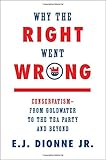 Why the Right Went Wrong by E.J. Dionne Jr.: A syndicated columnist and NPR commentator, Dionne is a pundit for people who hate pundits: lucid, funny, ideologically coherent without being rigid. Here, he argues that today’s radical conservatism is rooted not in Tea Party opposition to Obamacare but much further back in history with the Republican Party’s choice of Barry Goldwater for president in 1964. (Michael)
Why the Right Went Wrong by E.J. Dionne Jr.: A syndicated columnist and NPR commentator, Dionne is a pundit for people who hate pundits: lucid, funny, ideologically coherent without being rigid. Here, he argues that today’s radical conservatism is rooted not in Tea Party opposition to Obamacare but much further back in history with the Republican Party’s choice of Barry Goldwater for president in 1964. (Michael)
February:
 Leonard by William Shatner, with David Fisher: Anyone with fond memories of the original Star Trek has to be rooting for this book to be good. With his music and photography, Leonard Nimoy always came off as a fascinating, multi-faceted man. Shatner, on the other hand, often came off as a serious cheeseball. Wouldn’t it be marvelous to learn that, beneath the bluster and bad acting, Shatner is a sensitive and observant friend and biographer? (Michael)
Leonard by William Shatner, with David Fisher: Anyone with fond memories of the original Star Trek has to be rooting for this book to be good. With his music and photography, Leonard Nimoy always came off as a fascinating, multi-faceted man. Shatner, on the other hand, often came off as a serious cheeseball. Wouldn’t it be marvelous to learn that, beneath the bluster and bad acting, Shatner is a sensitive and observant friend and biographer? (Michael)
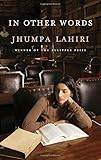 In Other Words by Jhumpa Lahiri: New Yorker readers got a sneak preview of this beguiling memoir of Lahiri’s struggle to learn Italian, a language she found herself drawn to for mysterious reasons. Written in Italian and translated by Ann Goldstein (who also translated the Elena Ferrante novels), Lahiri explores what it means to think and write in another language, and how a new language can give a writer a new voice. (Hannah)
In Other Words by Jhumpa Lahiri: New Yorker readers got a sneak preview of this beguiling memoir of Lahiri’s struggle to learn Italian, a language she found herself drawn to for mysterious reasons. Written in Italian and translated by Ann Goldstein (who also translated the Elena Ferrante novels), Lahiri explores what it means to think and write in another language, and how a new language can give a writer a new voice. (Hannah)
 Pandemic by Sonia Shah: Beware germophobes! This book may stoke your fears as Shah describes how vibro cholerae, a marine bacteria in the Bay of Bengal, caused a global outbreak of cholera in the late-19th century. Shah draws parallels between the technological advancements that allowed cholera to spread (steamships, canals, urbanization) with today’s rapid globalization, reporting on modern pathogens found all over the world. (Hannah)
Pandemic by Sonia Shah: Beware germophobes! This book may stoke your fears as Shah describes how vibro cholerae, a marine bacteria in the Bay of Bengal, caused a global outbreak of cholera in the late-19th century. Shah draws parallels between the technological advancements that allowed cholera to spread (steamships, canals, urbanization) with today’s rapid globalization, reporting on modern pathogens found all over the world. (Hannah)
March:
 The Immortal Irishman by Timothy Egan: At the height of the Great Famine of the 1840s, the hero of Egan’s new book, Thomas Meagher, led a failed uprising against British rule, for which he was banished to a Tasmanian prison colony. He promptly escaped and turned up in America, where he led the New York-based Irish Brigade in some of the bloodiest battles of the Civil War and later won a post as territorial governor of Montana. A Pulitzer-winning New York Times reporter and columnist, Egan is the author of The Worst Hard Time, about America in the Dustbowl years, which won a National Book Award. (Michael)
The Immortal Irishman by Timothy Egan: At the height of the Great Famine of the 1840s, the hero of Egan’s new book, Thomas Meagher, led a failed uprising against British rule, for which he was banished to a Tasmanian prison colony. He promptly escaped and turned up in America, where he led the New York-based Irish Brigade in some of the bloodiest battles of the Civil War and later won a post as territorial governor of Montana. A Pulitzer-winning New York Times reporter and columnist, Egan is the author of The Worst Hard Time, about America in the Dustbowl years, which won a National Book Award. (Michael)
 All the Single Ladies by Rebecca Traister: Despite what De Beers would have you think, only 20 percent of American women are married by age 29, a startling demographic shift that Traister examines in this group portrait of America’s female singletons. Based on interviews with academics, social scientists, and, of course, single ladies, this book shows how unmarried women have historically brought about great social change — and will continue to do so in the future. (Hannah)
All the Single Ladies by Rebecca Traister: Despite what De Beers would have you think, only 20 percent of American women are married by age 29, a startling demographic shift that Traister examines in this group portrait of America’s female singletons. Based on interviews with academics, social scientists, and, of course, single ladies, this book shows how unmarried women have historically brought about great social change — and will continue to do so in the future. (Hannah)
 Seven Brief Lessons on Physics by Carlo Rovelli: The title says it all. This 78-page primer was a bestseller in Italy, and came from a series of popular newspaper articles. It’s written to be accessible and to appeal to the imagination of the liberal arts major — as opposed to aspiring physicists already well versed in the theory of relativity. In writing for a general audience, Rovelli highlights the beauty of theories of gravity, time, and consciousness. (Hannah)
Seven Brief Lessons on Physics by Carlo Rovelli: The title says it all. This 78-page primer was a bestseller in Italy, and came from a series of popular newspaper articles. It’s written to be accessible and to appeal to the imagination of the liberal arts major — as opposed to aspiring physicists already well versed in the theory of relativity. In writing for a general audience, Rovelli highlights the beauty of theories of gravity, time, and consciousness. (Hannah)
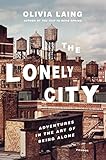 The Lonely City by Olivia Laing: This booklength essay offers an alert and moving exploration of art, anonymity, and modernity as they collide in that great crucible: the city. As in her first book, The Trip to Echo Spring, Laing deftly blends memoir and criticism; the chapters on David Wojnarowicz and Henry Darger, in particular, are not to be missed. (Garth)
The Lonely City by Olivia Laing: This booklength essay offers an alert and moving exploration of art, anonymity, and modernity as they collide in that great crucible: the city. As in her first book, The Trip to Echo Spring, Laing deftly blends memoir and criticism; the chapters on David Wojnarowicz and Henry Darger, in particular, are not to be missed. (Garth)
 The Abundance by Annie Dillard: Forty-two years after Pilgrim at Tinker Creek (which netted the author a nonfiction Pulitzer at the age of 29), Dillard has chosen both old and new essays to fill out her latest collection. In the older pieces corner, “Total Eclipse” exemplifies the author’s naturalistic bent, while “This Is the Life” adds her voice to the 9/11 canon. In the younger pieces corner, she follows a teenager memorizing Arthur Rimbaud, as well as a man who takes a snowball fight a little too seriously. Geoff Dyer provides the foreword. (Thom)
The Abundance by Annie Dillard: Forty-two years after Pilgrim at Tinker Creek (which netted the author a nonfiction Pulitzer at the age of 29), Dillard has chosen both old and new essays to fill out her latest collection. In the older pieces corner, “Total Eclipse” exemplifies the author’s naturalistic bent, while “This Is the Life” adds her voice to the 9/11 canon. In the younger pieces corner, she follows a teenager memorizing Arthur Rimbaud, as well as a man who takes a snowball fight a little too seriously. Geoff Dyer provides the foreword. (Thom)
 The Civil Wars of Julia Ward Howe by Elaine Showalter: Best known as the author of “The Battle Hymn of the Republic,” Howe was a prominent abolitionist and an early feminist who campaigned for women’s rights and social reform. This new biography focuses on her unhappy marriage and lack of independence from her husband, a private life at odds with her public achievements. (Hannah)
The Civil Wars of Julia Ward Howe by Elaine Showalter: Best known as the author of “The Battle Hymn of the Republic,” Howe was a prominent abolitionist and an early feminist who campaigned for women’s rights and social reform. This new biography focuses on her unhappy marriage and lack of independence from her husband, a private life at odds with her public achievements. (Hannah)
 Charlotte Brontë by Claire Harman: Arriving just in time for Charlotte Brontë’s 200th birthday, this biography will speak to those already familiar with her life story as well as those who have never read a word of her novels. This isn’t the first or last biography we’ll have of Brontë, but according to advance reviews from across the pond, it may be the most novelistic. Harman brings a storyteller’s finesse as she synthesizes decades of research and scholarship, and a realist’s eye to some of the more romantic Brontë myths. (Hannah)
Charlotte Brontë by Claire Harman: Arriving just in time for Charlotte Brontë’s 200th birthday, this biography will speak to those already familiar with her life story as well as those who have never read a word of her novels. This isn’t the first or last biography we’ll have of Brontë, but according to advance reviews from across the pond, it may be the most novelistic. Harman brings a storyteller’s finesse as she synthesizes decades of research and scholarship, and a realist’s eye to some of the more romantic Brontë myths. (Hannah)
 Heads by Jesse Jarnow: Subtitled “A Biography of Psychedelic America,” this new history suggests that psychedelic drugs and the Grateful Dead form a “secret American through-line between the 1950s and the present.” Jarnow, a Brooklyn-based musician and music journalist, uses the history of the legendary jam band and its loyal followers to explore an alternative America packed with “utopian homesteaders and self-taught black market chemists, spiritual seekers and pranksters, graffiti artists and government-wanted hackers, entrepreneurs and pioneering DJs.” (Michael)
Heads by Jesse Jarnow: Subtitled “A Biography of Psychedelic America,” this new history suggests that psychedelic drugs and the Grateful Dead form a “secret American through-line between the 1950s and the present.” Jarnow, a Brooklyn-based musician and music journalist, uses the history of the legendary jam band and its loyal followers to explore an alternative America packed with “utopian homesteaders and self-taught black market chemists, spiritual seekers and pranksters, graffiti artists and government-wanted hackers, entrepreneurs and pioneering DJs.” (Michael)
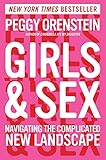 Girls & Sex by Peggy Orenstein: The author of Cinderella Ate My Daughter delves into the adolescent years, taking a look at a subject that most parents prefer to turn a blind eye to: the sex lives of teenage girls. Drawing on extensive interviews with young women, Orenstein explores the effects of pornography and social media on a new generation’s sexual coming of age. (Hannah)
Girls & Sex by Peggy Orenstein: The author of Cinderella Ate My Daughter delves into the adolescent years, taking a look at a subject that most parents prefer to turn a blind eye to: the sex lives of teenage girls. Drawing on extensive interviews with young women, Orenstein explores the effects of pornography and social media on a new generation’s sexual coming of age. (Hannah)
April:
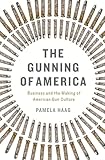 The Gunning of America by Pamela Haag: “God, guts, and guns made America free,” goes the old line. This revisionist history by the author of Marriage Confidential begs to differ. Drawing on documents from the archives of the Winchester and Colt companies, Haag shows how the gun industry, not freedom-loving anti-colonialists and frontiersmen, sowed the seeds of the bond between Americans and their firearms. (Michael)
The Gunning of America by Pamela Haag: “God, guts, and guns made America free,” goes the old line. This revisionist history by the author of Marriage Confidential begs to differ. Drawing on documents from the archives of the Winchester and Colt companies, Haag shows how the gun industry, not freedom-loving anti-colonialists and frontiersmen, sowed the seeds of the bond between Americans and their firearms. (Michael)
 All Tomorrow’s Parties by Rob Spillman: A memoir from the founder of Tin House, who was born in Berlin and grew up among West Berlin artists and intellectuals, the son of two musician parents. As a young adult, Spillman made his way to literary New York, only to return to Germany in his mid-20s after the fall of the Berlin Wall. As much a travelogue as a memoir, Spillman portrays the changing cultural landscape of Berlin while documenting his own coming of age and search for a place to call home. (Hannah)
All Tomorrow’s Parties by Rob Spillman: A memoir from the founder of Tin House, who was born in Berlin and grew up among West Berlin artists and intellectuals, the son of two musician parents. As a young adult, Spillman made his way to literary New York, only to return to Germany in his mid-20s after the fall of the Berlin Wall. As much a travelogue as a memoir, Spillman portrays the changing cultural landscape of Berlin while documenting his own coming of age and search for a place to call home. (Hannah)
 One-Man Band by Simon Callow: This is the third volume of Callow’s four-volume biography of the great American icon and enigma, Orson Welles. In this volume, which covers the years 1947 to 1964, Callow tracks Welles’s self-exile from the United States when he produced some of his most lasting work, including Touch of Evil. Watch the video of Welles slurring his lines in a late Paul Masson wine commercial, then read Callow’s bio to be reminded why this is so sad. (Michael)
One-Man Band by Simon Callow: This is the third volume of Callow’s four-volume biography of the great American icon and enigma, Orson Welles. In this volume, which covers the years 1947 to 1964, Callow tracks Welles’s self-exile from the United States when he produced some of his most lasting work, including Touch of Evil. Watch the video of Welles slurring his lines in a late Paul Masson wine commercial, then read Callow’s bio to be reminded why this is so sad. (Michael)
 67 Shots by Howard Means: For many Americans, the 1960s ended on May 4, 1970, when a National Guard troop fired 67 bullets into a peaceful crowd of Vietnam War protestors at Kent State University, killing four and injuring nine others. Means uses recently compiled oral histories to piece together the inside story of the campus tragedy that sounded the final death knell for popular support for the war in Vietnam. (Michael)
67 Shots by Howard Means: For many Americans, the 1960s ended on May 4, 1970, when a National Guard troop fired 67 bullets into a peaceful crowd of Vietnam War protestors at Kent State University, killing four and injuring nine others. Means uses recently compiled oral histories to piece together the inside story of the campus tragedy that sounded the final death knell for popular support for the war in Vietnam. (Michael)
 Why Save the Bankers? by Thomas Piketty: Remember when everyone was obligated to pretend to have read Piketty’s 700-page tome Capital in the Twenty-First Century? Now, the wise folks at Houghton Mifflin have produced a Piketty for the proletariat, compiling eight years of the economist’s columns written for the French magazine Libération. The book begins in September 2008 just after the collapse of Lehman Brothers and takes readers through the aftermath of the crisis that followed, offering Pikettian analysis of the Obama presidency and the European Union’s debt woes. (Michael)
Why Save the Bankers? by Thomas Piketty: Remember when everyone was obligated to pretend to have read Piketty’s 700-page tome Capital in the Twenty-First Century? Now, the wise folks at Houghton Mifflin have produced a Piketty for the proletariat, compiling eight years of the economist’s columns written for the French magazine Libération. The book begins in September 2008 just after the collapse of Lehman Brothers and takes readers through the aftermath of the crisis that followed, offering Pikettian analysis of the Obama presidency and the European Union’s debt woes. (Michael)
 CRUSH edited by Cathy Alter and Dave Singleton: An anthology of essays about formative celebrity crushes from the likes of Stephen King, Jodi Picoult, Roxane Gay, James Franco, Emily Gould, and more. Swoon-worthy subjects include Jared Leto, River Phoenix, Mary Tyler Moore, Paul Newman, and of course, Donny Osmond. It’s hard to resist a book that’s having this much fun with its subject. (Hannah)
CRUSH edited by Cathy Alter and Dave Singleton: An anthology of essays about formative celebrity crushes from the likes of Stephen King, Jodi Picoult, Roxane Gay, James Franco, Emily Gould, and more. Swoon-worthy subjects include Jared Leto, River Phoenix, Mary Tyler Moore, Paul Newman, and of course, Donny Osmond. It’s hard to resist a book that’s having this much fun with its subject. (Hannah)
 True Crimes by Kathryn Harrison: An essay collection from the author of the memoirs The Kiss and The Mother Knot. Written over the course of 10 years, these personal essays are about the author’s family: her parents, her children, her in-laws, and even her dog. Katie Roiphe describes the collection as “the most honest family album ever.” (Hannah)
True Crimes by Kathryn Harrison: An essay collection from the author of the memoirs The Kiss and The Mother Knot. Written over the course of 10 years, these personal essays are about the author’s family: her parents, her children, her in-laws, and even her dog. Katie Roiphe describes the collection as “the most honest family album ever.” (Hannah)
 We Are As Gods by Kate Daloz: In the early 1970s, as war raged in the jungles of Vietnam and in the streets of America’s cities, millions of baby boomers headed for the hills in search of rural authenticity. Shunning life in America’s “plastic” suburbs, these back-to-the-landers built geodesic domes and formed non-traditional families to populate them. Daloz, herself a child of former Peace Corps volunteers who decamped to Vermont’s Northeast Kingdom, focuses on a small group of communards who struggle to hold fast to their high-minded ideals as they endure brutal Northern winters without indoor plumbing or electricity — and, some might argue, basic common sense. (Michael)
We Are As Gods by Kate Daloz: In the early 1970s, as war raged in the jungles of Vietnam and in the streets of America’s cities, millions of baby boomers headed for the hills in search of rural authenticity. Shunning life in America’s “plastic” suburbs, these back-to-the-landers built geodesic domes and formed non-traditional families to populate them. Daloz, herself a child of former Peace Corps volunteers who decamped to Vermont’s Northeast Kingdom, focuses on a small group of communards who struggle to hold fast to their high-minded ideals as they endure brutal Northern winters without indoor plumbing or electricity — and, some might argue, basic common sense. (Michael)
 The Midnight Assassin by Skip Hollandsworth: Those who like their true-crime leavened with historical insight may want to take a look at this tale of “America’s first serial killer” who terrorized frontier Austin, Texas, in the 1880s. Hollandsworth, executive editor of Texas Monthly, chronicles the hunt for a vicious murderer who attacked women with axes, knives, and even steel rods. “Skip Hollandsworth has a bloodhound’s nose for a great tale,” writes Hampton Sides, author of Ghost Soldiers. “Through scrupulous research and a finely tuned sense of the gothic, Hollandsworth has brought this Texas-sized true-crime story, more than a century old, to vivid, chilling life on the page.” (Michael)
The Midnight Assassin by Skip Hollandsworth: Those who like their true-crime leavened with historical insight may want to take a look at this tale of “America’s first serial killer” who terrorized frontier Austin, Texas, in the 1880s. Hollandsworth, executive editor of Texas Monthly, chronicles the hunt for a vicious murderer who attacked women with axes, knives, and even steel rods. “Skip Hollandsworth has a bloodhound’s nose for a great tale,” writes Hampton Sides, author of Ghost Soldiers. “Through scrupulous research and a finely tuned sense of the gothic, Hollandsworth has brought this Texas-sized true-crime story, more than a century old, to vivid, chilling life on the page.” (Michael)
 Kill ‘Em and Leave by James McBride: A biography of James Brown, one of the great musical artists of the 20th century and among the most influential. McBride, who is a musician as well as the award-winning author of The Color of Water and The Good Lord Bird, is the perfect biographer for Brown, finding universal American themes in the musician’s life story: the divide between the North and South, rich and poor, and black and white. McBride also delves into the legal battles over Brown’s estate, a subject that sounds so complicated and epic that it could probably warrant its own book. (Hannah)
Kill ‘Em and Leave by James McBride: A biography of James Brown, one of the great musical artists of the 20th century and among the most influential. McBride, who is a musician as well as the award-winning author of The Color of Water and The Good Lord Bird, is the perfect biographer for Brown, finding universal American themes in the musician’s life story: the divide between the North and South, rich and poor, and black and white. McBride also delves into the legal battles over Brown’s estate, a subject that sounds so complicated and epic that it could probably warrant its own book. (Hannah)
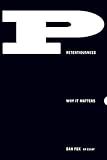 Pretentiousness by Dan Fox: In this book-length essay, art critic Fox wants to make an argument for the virtues of pretentiousness. “Without pretension,” Fox writes, “we would never have 99% of the art, literature, music, buildings, theater, fashion, cinema, poetry, philosophy, food or design that we love.” Drawing on a wide variety of sources from literature to film to fashion and the art world, this energetic and entertaining book is written with a clarity and humor that is decidedly lacking in pretension. (Hannah)
Pretentiousness by Dan Fox: In this book-length essay, art critic Fox wants to make an argument for the virtues of pretentiousness. “Without pretension,” Fox writes, “we would never have 99% of the art, literature, music, buildings, theater, fashion, cinema, poetry, philosophy, food or design that we love.” Drawing on a wide variety of sources from literature to film to fashion and the art world, this energetic and entertaining book is written with a clarity and humor that is decidedly lacking in pretension. (Hannah)
 Violation by Sallie Tisdale: “A Buddhist woman who’s written about porn,” one critic has said of Tisdale. “Do you really need another reason to read her?” Well, if you put it that way, probably not. Portland-based indie press Hawthorne Books has compiled this first-ever essay collection by the author of Talk Dirty to Me and The Best Thing I Ever Tasted. The essays span Tisdale’s 30-year career and range in subject from the biology of flies to the author’s experience of working in an abortion clinic. (Michael)
Violation by Sallie Tisdale: “A Buddhist woman who’s written about porn,” one critic has said of Tisdale. “Do you really need another reason to read her?” Well, if you put it that way, probably not. Portland-based indie press Hawthorne Books has compiled this first-ever essay collection by the author of Talk Dirty to Me and The Best Thing I Ever Tasted. The essays span Tisdale’s 30-year career and range in subject from the biology of flies to the author’s experience of working in an abortion clinic. (Michael)
May:
 Labor of Love by Moira Weigel: In this thoughtful work of social history, Weigel likens modern dating to “the worst, most precarious form of contemporary labor: an unpaid internship.” Weigel examines the history of dating, and explains why dating not only feels like work, but is a particular kind of unpaid labor shaped by larger economic forces. Our dating rituals (and apps) have long needed the context that this book provides. (Hannah)
Labor of Love by Moira Weigel: In this thoughtful work of social history, Weigel likens modern dating to “the worst, most precarious form of contemporary labor: an unpaid internship.” Weigel examines the history of dating, and explains why dating not only feels like work, but is a particular kind of unpaid labor shaped by larger economic forces. Our dating rituals (and apps) have long needed the context that this book provides. (Hannah)
 Little Labors by Rivka Galchen: Galchen is to fiction what Ferran Adrià is to gastronomy, serving up the whimsical, the startling, and the revelatory in the guise of the delightfully familiar. And here she comes again, bearing a tray of amuse-bouches: a short book of linked stories and essays about parenthood. (Garth)
Little Labors by Rivka Galchen: Galchen is to fiction what Ferran Adrià is to gastronomy, serving up the whimsical, the startling, and the revelatory in the guise of the delightfully familiar. And here she comes again, bearing a tray of amuse-bouches: a short book of linked stories and essays about parenthood. (Garth)
 White Sands by Geoff Dyer: Originally titled “Where Do We Come From, What Are We, Where Are We Going,” this collection of travel essays asks those three very questions as its British author tours Beijing’s Forbidden City with a guide who isn’t in fact a tour guide, journeys to French Polynesia to soak up the atmosphere that inspired painter Paul Gauguin, and picks up a hitchhiker near a prison at White Sands, N.M. (Michael)
White Sands by Geoff Dyer: Originally titled “Where Do We Come From, What Are We, Where Are We Going,” this collection of travel essays asks those three very questions as its British author tours Beijing’s Forbidden City with a guide who isn’t in fact a tour guide, journeys to French Polynesia to soak up the atmosphere that inspired painter Paul Gauguin, and picks up a hitchhiker near a prison at White Sands, N.M. (Michael)
 Unforbidden Pleasures by Adam Phillips: The latest from the prolific author of Missing Out, On Balance, On Flirtation, and Side Effects — to name just a few of Phillips’s curiously addictive essay collections, which marry Freudian theory with a literary sensibility. This new collection examines the relationship between prohibition and pleasure, pushing back against the notion that things that are forbidden are necessarily more enjoyable. (Hannah)
Unforbidden Pleasures by Adam Phillips: The latest from the prolific author of Missing Out, On Balance, On Flirtation, and Side Effects — to name just a few of Phillips’s curiously addictive essay collections, which marry Freudian theory with a literary sensibility. This new collection examines the relationship between prohibition and pleasure, pushing back against the notion that things that are forbidden are necessarily more enjoyable. (Hannah)
 Robert Parris Moses by Laura Visser-Maessen: No one was as central to the battle for voting rights for African Americans in Mississippi in the 1960s as Bob Moses, and few figures of that era are more deserving of a full-dress biography. This book, like an earlier Moses biography And Gently He Shall Lead Them, is an academic title, written by a Dutch historian and published by the University of North Carolina Press. No matter. Any treatment of Moses’s role in the violent crucible of the 1964 Freedom Summer and his later work with the math literacy program, The Algebra Project, is bound to be riveting. (Michael)
Robert Parris Moses by Laura Visser-Maessen: No one was as central to the battle for voting rights for African Americans in Mississippi in the 1960s as Bob Moses, and few figures of that era are more deserving of a full-dress biography. This book, like an earlier Moses biography And Gently He Shall Lead Them, is an academic title, written by a Dutch historian and published by the University of North Carolina Press. No matter. Any treatment of Moses’s role in the violent crucible of the 1964 Freedom Summer and his later work with the math literacy program, The Algebra Project, is bound to be riveting. (Michael)
 Joe Gould’s Teeth by Jill Lepore: Legendary New Yorker writer Joseph Mitchell first discovered Joseph Gould on Manhattan’s Lower East Side. In Gould, Mitchell found an eccentric and charismatic writer who was supposedly working on an epic manuscript called “The Oral History of Our Time.” When the manuscript went missing after Gould’s death, Mitchell concluded it had never really existed in the first place. Nearly 60 years later, New Yorker writer Lepore picks up where Mitchell left off, to further investigate one of the magazine’s most elusive subjects. (Hannah)
Joe Gould’s Teeth by Jill Lepore: Legendary New Yorker writer Joseph Mitchell first discovered Joseph Gould on Manhattan’s Lower East Side. In Gould, Mitchell found an eccentric and charismatic writer who was supposedly working on an epic manuscript called “The Oral History of Our Time.” When the manuscript went missing after Gould’s death, Mitchell concluded it had never really existed in the first place. Nearly 60 years later, New Yorker writer Lepore picks up where Mitchell left off, to further investigate one of the magazine’s most elusive subjects. (Hannah)
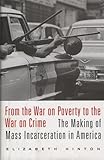 From the War on Poverty to the War on Crime by Elizabeth Hinton: How did the “land of the free” become the home of the world’s largest prison system? Hinton, a professor of African-American Studies at Harvard, traces the mass incarceration of America’s young black men to a surprising source: President Lyndon Johnson’s Great Society programs of the 1960s. With America’s inner cities ablaze with urban riots, Hinton writes, Johnson combined his famous “War on Poverty” with a lesser-known call for a “War on Crime” — which, over time, helped create a penal system that now locks up one in every 11 black men in America. (Michael)
From the War on Poverty to the War on Crime by Elizabeth Hinton: How did the “land of the free” become the home of the world’s largest prison system? Hinton, a professor of African-American Studies at Harvard, traces the mass incarceration of America’s young black men to a surprising source: President Lyndon Johnson’s Great Society programs of the 1960s. With America’s inner cities ablaze with urban riots, Hinton writes, Johnson combined his famous “War on Poverty” with a lesser-known call for a “War on Crime” — which, over time, helped create a penal system that now locks up one in every 11 black men in America. (Michael)
 You May Also Like by Tom Vanderbilt: “I like, therefore I am” is the motto of our social media avatars, and yet — red heart and thumbs-up emojis aside — what does it mean to like something? How are preferences formed? By something in our biology? From our life experiences? Do we shape our preferences or do our preferences shape us? Vanderbilt tackles these questions and more in this book that you may or may not like, but will certainly find interesting. (Hannah)
You May Also Like by Tom Vanderbilt: “I like, therefore I am” is the motto of our social media avatars, and yet — red heart and thumbs-up emojis aside — what does it mean to like something? How are preferences formed? By something in our biology? From our life experiences? Do we shape our preferences or do our preferences shape us? Vanderbilt tackles these questions and more in this book that you may or may not like, but will certainly find interesting. (Hannah)
 The Apache Wars by Paul Andrew Hutton: Fans of Philipp Meyer’s epic novel The Son may want to check out this nonfiction account of Mickey Free — born Felix Telles — a mixed-race child whose kidnapping by Apache Native Americans set off a 30-year war between the Apaches and federal troops. Hutton, a professor at the University of New Mexico, relates the violent history of America’s Southwest borderlands where dwindling Native bands, led by legendary chiefs Cochise and Geronimo, made their last stand against the American war machine. (Michael)
The Apache Wars by Paul Andrew Hutton: Fans of Philipp Meyer’s epic novel The Son may want to check out this nonfiction account of Mickey Free — born Felix Telles — a mixed-race child whose kidnapping by Apache Native Americans set off a 30-year war between the Apaches and federal troops. Hutton, a professor at the University of New Mexico, relates the violent history of America’s Southwest borderlands where dwindling Native bands, led by legendary chiefs Cochise and Geronimo, made their last stand against the American war machine. (Michael)
 Oneida by Ellen Wayland-Smith: A history of the Christian utopian sex-cult cum cookware and flatware makers, by a descendant of one of the group’s founders. As the book would have it, this was possibly the oddest moment in America, when extreme religious fervor in the 19th century resulted in a free-love commune for the devout, which in turn became a major corporation and one of the hallmarks of bourgeois respectability in 20th-century America. (Lydia)
Oneida by Ellen Wayland-Smith: A history of the Christian utopian sex-cult cum cookware and flatware makers, by a descendant of one of the group’s founders. As the book would have it, this was possibly the oddest moment in America, when extreme religious fervor in the 19th century resulted in a free-love commune for the devout, which in turn became a major corporation and one of the hallmarks of bourgeois respectability in 20th-century America. (Lydia)
June and beyond
 Hunger by Roxane Gay: A powerful new memoir about food, weight, self-image, and what it means to feed yourself. Fans of Gay’s Tumblr blog will recognize these themes from her disarmingly diaristic posts about cooking Blue Apron meals. In an era of Instagrammed desserts and lifestyle blogs, Gay’s writing about food is refreshingly sensitive to the emotions we bring to cooking and eating. (Hannah)
Hunger by Roxane Gay: A powerful new memoir about food, weight, self-image, and what it means to feed yourself. Fans of Gay’s Tumblr blog will recognize these themes from her disarmingly diaristic posts about cooking Blue Apron meals. In an era of Instagrammed desserts and lifestyle blogs, Gay’s writing about food is refreshingly sensitive to the emotions we bring to cooking and eating. (Hannah)
 The Hatred of Poetry by Ben Lerner: An award-winning poet before he became known as a novelist (and recently crowned as a MacArthur genius), Lerner defends his life’s work in this book-length essay about what it means to resist poetry. Lerner examines poetry’s great haters, as well as the work of some of the best and worst poets. (Hannah)
The Hatred of Poetry by Ben Lerner: An award-winning poet before he became known as a novelist (and recently crowned as a MacArthur genius), Lerner defends his life’s work in this book-length essay about what it means to resist poetry. Lerner examines poetry’s great haters, as well as the work of some of the best and worst poets. (Hannah)
I’m Just a Person by Tig Notaro: Low-key, little-known comedian Tig Notaro had a run of bad luck to rival Job’s: first she was hospitalized with a near-fatal intestinal infection, then her mother died, and then she went through a break-up. Shortly after that, she was diagnosed with bilateral breast cancer. A few days after her cancer diagnosis, Notaro took her grief on stage and delivered a brazenly honest stand-up set that went viral. Notaro then found herself on a completely different roller coaster as she experienced fame and national acclaim. Her aptly named memoir reflects on an unexpectedly eventful year. (Hannah)
 Battle for Bed-Stuy by Michael Woodsworth: The Johnson-era War on Poverty, despised for its over-reach by conservatives and lamented for its under-performance by liberals, hasn’t fared well in history, so it is a surprise to see a book-length study touting its successes. Battle for Bed-Stuy details how LBJ’s antipoverty programs tapped into existing networks of black residents in Brooklyn’s Bedford-Stuyvesant neighborhood to battle endemic crime and shore up the local social safety net — in the process, ironically, setting the stage for the present-day gentrification of the once solidly black neighborhood. (Michael)
Battle for Bed-Stuy by Michael Woodsworth: The Johnson-era War on Poverty, despised for its over-reach by conservatives and lamented for its under-performance by liberals, hasn’t fared well in history, so it is a surprise to see a book-length study touting its successes. Battle for Bed-Stuy details how LBJ’s antipoverty programs tapped into existing networks of black residents in Brooklyn’s Bedford-Stuyvesant neighborhood to battle endemic crime and shore up the local social safety net — in the process, ironically, setting the stage for the present-day gentrification of the once solidly black neighborhood. (Michael)
The Secret Lives of Web Pages by Paul Ford: Every week, it seems, some starlet’s outsized derrière or surgically reconfigured cheekbones “breaks the Internet,” but how is the Internet built in the first place? Ford, an early blogger and adviser to sites like Medium and Kickstarter, explains it all for you in this breezy overview of the hows and whys of what happens when a web page loads onto your browser. (Michael)
Behind the Glass Wall by Aleksandar Hemon: In 2012, Hemon, a Bosnian-American fiction writer best known for his novel The Lazarus Project, spent a few months as a “writer-in-residence” at the United Nations, meeting with officials, attending staff meetings, and sitting in on sessions of the Security Council. In Behind the Glass Wall, Hemon struggles to come to grips with the daily reality of a troubled institution that responded all too slowly to the humanitarian crisis that crippled his home city of Sarajevo, but whose charter allowed for the prosecution of Serbian war criminals. (Michael)
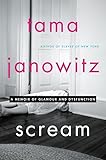 Scream by Tama Janowitz: A memoir from the author of Slaves of New York, the acclaimed short story collection about young people trying to make it in downtown Manhattan in the 1980s. Following the publication of Slaves, Janowitz was grouped with the “Brat Pack” writers alongside Bret Easton Ellis and Jay McInerney — famed for their deadpan minimalist style. Scream reflects on that time, as well as the more universal life experiences that followed as Janowitz became a wife, mother, and caregiver to her aging mother. (Hannah)
Scream by Tama Janowitz: A memoir from the author of Slaves of New York, the acclaimed short story collection about young people trying to make it in downtown Manhattan in the 1980s. Following the publication of Slaves, Janowitz was grouped with the “Brat Pack” writers alongside Bret Easton Ellis and Jay McInerney — famed for their deadpan minimalist style. Scream reflects on that time, as well as the more universal life experiences that followed as Janowitz became a wife, mother, and caregiver to her aging mother. (Hannah)








